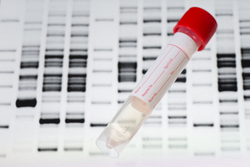
With the help of genetics, prostate specific antigen (PSA) screenings may become more accurate and reduce the number of unnecessary prostate biopsies, according to a new study from Northwestern Medicine.
Personalized PSA testing using genetic variants could account for an 18 percent reduction in the number of men who likely would have undergone unnecessary biopsies, according to the study. It will be published in the May 2013 issue of The Journal of Urology.
The high survival rate of men with prostate cancer is largely a reflection of PSA testing, but support for the widespread use of the screening method has been the topic of recent debate because of its limited specificity.
“By utilizing a person’s genetic makeup we can personalize care when he comes in for a PSA screening,” said Brian Helfand, MD, lead author of the study. “We may be able to prevent some men from having an unnecessary biopsy and prevent a delay in biopsy for men who may have an aggressive disease.”
Helfand is an adjunct assistant professor of cell and molecular biology at Northwestern University Feinberg School of Medicine.
For 98 percent of the men, genetic adjustment of PSA levels did not change the outcome of their screening. But genetic correction was important for the 17 men who were reclassified as no longer meeting biopsy criteria and the three whose condition was up classified, and it was recommended they get a biopsy, based on their genetic adjustment.
“If our results are validated, genetic adjustments could potentially prevent 15 to 20 percent of prostate biopsies,” said William J. Catalona, MD, senior author of the study. “Since it has been estimated that more than 1 million biopsies are performed in the United States annually, this could translate into 150,000 to 200,000 potentially unnecessary biopsies every year.”
In addition to cost savings, fewer biopsies mean fewer adverse outcomes, such as infection, sepsis, and hospitalization, he said.
Catalona is a professor of urology at Feinberg, director of the clinical prostate cancer program at the Robert H. Lurie Comprehensive Cancer Center of Northwestern University and an urologist at Northwestern Memorial Hospital.
Variants in genes, like those that help determine your height, are responsible for higher or lower levels of PSA expression. Recent studies have identified genetic variants associated with increased serum PSA concentrations, raising the possibility that a man’s genetic make-up could interfere with an accurate PSA reading.
In this study, four variants previously associated with PSA levels were determined in 964 Caucasian volunteers without prostate cancer. Genetic correction of their PSA was performed by dividing each man’s PSA value by his combined genetic risk. Analyses were used to compare the percentage of men who would meet commonly used biopsy thresholds (2.5 ng/ml or greater, or 4.0 ng/ml or greater) before and after genetic correction.
Assuming that a diagnostic laboratory has the available equipment, supplies, and trained personnel, it would cost 60 cents per person to add genetic personalization to a PSA test.
The researchers are now investigating personalized PSA testing in black men, and have plans to investigate genetic variants which impact PSA levels in other races as well.
This study was funded by the Urological Research Foundation, Prostate SPORE Grant (P50CA90386-05S2) and a Robert H. Lurie Comprehensive Cancer Center Grant (P30 CA60553) as well as the Louis Feil Charitable Lead Trust.






